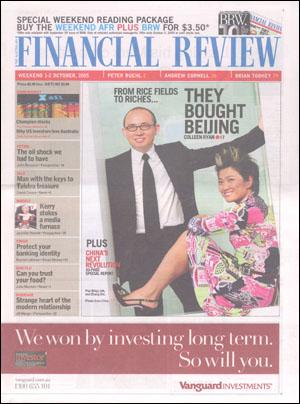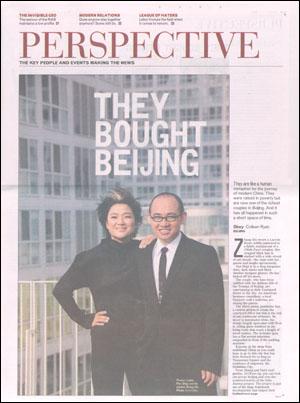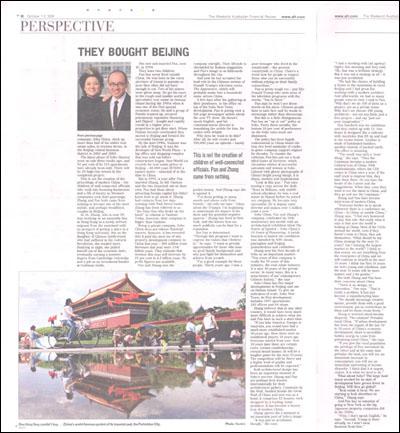 They are like a human metaphor for the journey of modern China. They were raised in poverty but are now one of the richest couples in Beijing. And it has all happened in such a short space of time.
They are like a human metaphor for the journey of modern China. They were raised in poverty but are now one of the richest couples in Beijing. And it has all happened in such a short space of time.
Zhang Xin wears a lacroix dress,wildly patterned in a fabric reminiscent of a 1960s Pucci creation. Her cropped black hair is slashed with a wide streak of ash blonde. She chats with her guests and laughs uproariously.
Pan Shiyi is in a deep turquoise shirt,dark slacks and black slimline designer glasses. He has kicked off his shoes.
The couple,who have been saddled with the dubious title of the Trumps of Beijing,are entertaining in their Courtyard House in the Sky. An American business consultant,a local financier and a ballerina are among the guests.
The three-storey penthouse has a central atrium to create the courtyard effect but that is the end of any traditional influence. Its d cor is minimalist white,the design largely open-plan with floor to ceiling glass windows in the living room that reach a height of seven metres. The in-house gym has a flat-screen television suspended in front of the walking machine.
It seems as far away from traditional China as you could hope to go in this city that has been focused for so long on Tiananmen Square and the residence of emperors,the Forbidden City.
From Zhang and Pan's roof garden,34 floors up,you can look out across Beijing and over the scattered towers of the Soho Jianwai project. The project is just one of the huge trademark developments that helped their company,SOHO China,clock up more than half of the entire real estate sales,in revenue terms,in the Beijing central business district in 2002 and 2003.
The latest phase of SOHO Jianwai went on sale three weeks ago,and 92 per cent of its 133 apartments have already been sold. There will be 20 high-rise towers in the completed project.
This is not the creation of the princelings of modern China-the children of well-connected officials who walk into booming businesses and a life of luxury as Western companies seek their patronage. Zhang and Pan both came from nothing to become one of the most stylish,and perhaps wealthiest,couples in Beijing.
At 16,Zhang,who is now 39,was working on an assembly line in Hong Kong as a newly arrived migrant from the mainland with no prospect of getting a place in a Hong Kong university. But as the daughter of Chinese intellectuals who had suffered in the Cultural Revolution,she wanted more. Studying at night,she pulled herself out of the economic mire,eventually earning a masters degree from Cambridge University and a job as an investment banker at Goldman Sachs. She met and married Pan,now 41,in 1994.
She met and married Pan,now 41,in 1994.
They have two children.
Pan has never lived outside China. He was born in the rural province of Gansu to parents so poor they often did not have enough to eat. Two of his sisters were given away. He got his start in the rough-and-tumble world of speculative real estate on Hainan Island during the 1980s when it was one of the first special economic zones. He and a group of friends teamed up,secured poisonously expensive financing and flipped-bought and rapidly resold at a higher price-properties to get their start. When Hainan became overheated they moved to Beijing and formed the successful Vantone group.
By the mid-1990s,Vantone was the talk of .Beijing. It was the developer of New World Plaza- a big office and shopping complex thet was sold out before construction began. New World set records for real estate prices in Beijing-48,000 yuan $7800 a square metre-unheard of at the time in China.
But in 1995,a year after Pan married Zhang,he left Vantone and the two branched out on their own. Pan had ideas about attracting foreign capital but didn't know how to go about it. Zhang had contacts from her days working with Wall Street banks. Zhang has been referred to as "The Yoko Ono who broke up the band"in relation to Vantone. Today,however,their company is bigger than Vantone.
Being a private company,SOHO China does not release financial reports. However,it has revealed that it paid the most tax of any property development company in China last year-300 million yuan. Revenues last year were 3.64 billion yuan. They estimate that revenue this year will increase by 25 Per cent to 4.5 billion yuan. No profit figures are available.
Pan and Zhang own the company outright. Their lifestyle is chronicled by fashion magazines and Pan's image is on billboards throughout the city.
And now he has accepted the lead role in the Chinese version of Donald Trump's television series The Apprentice,which will probably make him a household name across China.
A few days after the gathering at their penthouse,in his office on top of the SOHO New Town development,Pan is poring over a full-page newspaper article about the new TV show. He doesn't speak English,and his communications director is translating the article for him. He smiles with delight.
Why does he want to do this?After all,he will receive just 100,000 yuan an episode-barely pocket money. And Zhang says she is against it.
"I've been getting so many emails and phone calls from friends,"she tells me later."Jokes about the Trumps. I'm beginning to understand the impact of the show and the potential negative aspects."Zhang has lived in New York,and she knows how too much publicity can be fatal for a reputation.
But Pan is determined.
"Through this program I want to express the values that I believe in,"he says."I want to provide opportunities for those who have no good family background and who just fight for themselves and achieve form scratch.
"I'm a good example for these people,Thirty years ago,I was a poor teenager who lived in the countryside-the poorest countryside in China. There's a trend now for people to respect those who can be successful without relying on their family connections."
Pan is pretty tough too-just like Donald Trump who ends most of his television programs with the words,"You're fired."
Pan says he won't use those words on his show. Chinese people have to save face and he wants to encourage rather than discourage.
But this is a little disingenuous. Pan has an"up or out"policy at SOHO. Every three months,the bottom 10 per cent of performers on the SOHO sales team are dismissed.
The policy has been hugely controversial in China where the iron rice bowl mentality of cradle-to-grave company support reigned for decades. To counter the criticism,Pan has put out a book titled Game of survivor,which chronicles stories of successful salesmen and women at SOHO. Littered with glossy photographs of China's bright young things,it is sharp,modern and inspirational.
"Look at this guy,"Pan says,tossing a copy across the desk."Born in Sichuan,only middle school education,he was a coal miner in Shanxi before he joined our company. He became very successful. He is deputy sales director and makes over 1 million yuan a year."

Soho china ,Pan and Zhang's company,celebrated its 10th anniversary last month with an architectural exhibition titled The power of Symbol- Soho china's 10 Years of pioneering. A lavish function to launch the exhibition was attended by 600 clients,journalists and Beijing powerbrokers and celebrities.
Zhang sees the first decade of Soho as an important marker. "Ten years of this company is really the 10 years of this industry,the real estate industry. It is also 10 years of the industry,the real estate industry. It is also 10 years of the private sector. In many ways,this is a mini- history of our contemporary Chinese history."she says
Soho china has five major developments in Beijing and one on Hainan Island. To give an indication of scale,Soho New Town,its first development,includes 1897 apartments,283 offices and 48 Shops.
Zhang believes that in any other country,it would have been much more difficult to achieve what she and Pan hove in such a short time.
"If you take America,Europe or Australia,you would have had a much more established market 10 years ago. Here there were no established players 10 years ago. Everyone started from zero. Now 10 years later there are certain rules,certain establishments,certain brand names. Iit will be a tougher game for the next 10 years. The competition will be fierce and a higher level of quality and professionalism will be expected."
Bold architectural design has been an important element of Soho's success. Zhang and Pan are perhaps best known internationally for their architectural gallery,Commune by the Wall. Nestled beside the Great Wall of China and now run as a hotel,it comprises 12 houses,each designed by a leading Asian architect. It has become a luxury icon of modern China.
Zhang agrees the Commune is an important part of Soho's image.
"It was just so accidental,though,"she says.
"I had a meeting with [ad agency] Ogilvy this morning and they said, Oh,that was a brilliant strategy.' But it was not a strategy at all-it was just accidental.
"We had the chance of building a house in the mountains in rural Beijing and I had great fun working with a modern architect. And afterwards,we had so many people come to visit,I said to Pan, Why don't we do 100 of them as a project,not as a private home. Why don't we choose 100 young architects- not set any limit,just a free project-and say just use your imagination'."
One hundred was too ambitious and they ended up with 12. One house is designed like a suitcase with manholes that lift up and lead to the rooms below. Another is made of laminated bamboo,another entirely of packed earth. The effect is stunning.
"The result was such a wow' thing,"she says."Then the Commune became a modern cultural icon of China. With multinationals,where the CEO comes to China once a year,if the staff want to impress him,they take them there. Or you have the heads of the Louvre and the Guggenheim. When they come they want to see the latest in China,and they go and see the Commune."
Zhang and Pan have become mini-icons of modern China.
"Everyone invites us to speak whenever there is a conference on China- in China or outside China,"Zhang says. "I feel very honoured to play that role. But really what is says is that now the world is looking at China. Most of the CEOs around the world,even if they haven't come to China,they ask themselves, What should be my China strategy for the next 10 years?Am I missing the largest market in the world?' I think to that extent,we are benefiting from the resurgence of China and we will continue to benefit in the next 10 years. I think the first 10 years we were young and rebellious,and the next 10 years will be more mature and a bit gentler."
But both Zhang and Pan have their concerns about China.
"There is no design,no innovation,"Pan says. "That is really a problem. It has just become a manufacturing base.
"We should encourage creative talents,provide them with a good environment,put no restrictions on them and let them create freely."
Zhang is worried about income disparity. The solution?Privatise rural China. "If urban development has been the engine of the last 10 to 20 years of China's economic development,there is incredible hidden energy to come from privatizing rural China,"she says.
"If you give the rural population the privilege of free movement to the cities and at the same time privatize the land,you will see an immediate increase in consumption,you will see an immediate narrowing of income disparity. I think that it is urgent,urgent. It is what we need to do."
What about Soho?The large land tracts needed for its style of development have grown fewer in Beijing. Will they go global?
"Real estate is local. We are starting to look elsewhere in China,"Zhang says.
And Pan has no intention of going to New York as the big Japanese property companies did in the 1980s.
"First,I don't speak English,"he says,"Second,Trump is there already,so I won't steal business from him."





